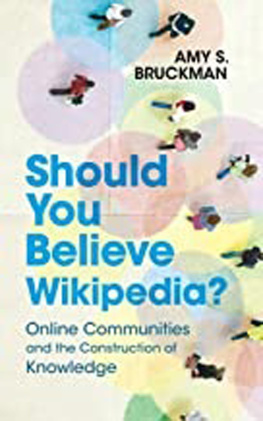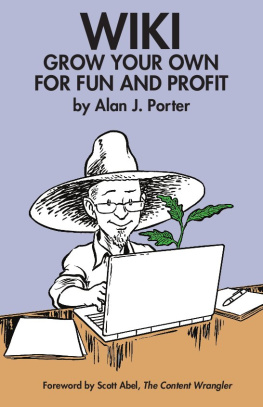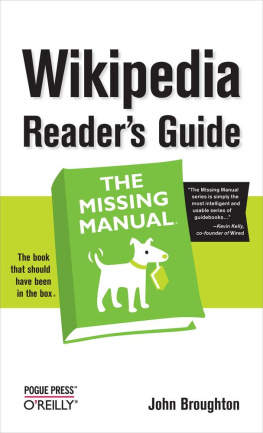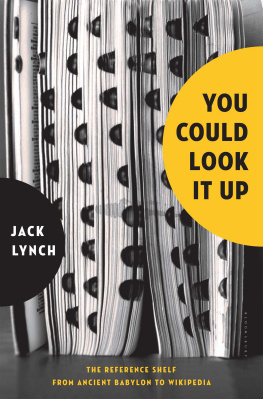Paul A. Thomas is a library specialist at the University of Kansas in Lawrence, as well as a PhD candidate at the Emporia State School of Library and Information Management in Emporia, Kansas. Since 2007, Thomas has been an avid Wikipedia editor who contributes to the encyclopedia under the moniker Gen. Quon. In his many years on the site, he has created 260 articles, made more than 60,000 edits, and promoted more than 296 articles to good or featured article status. From 2017 to 2020, he also served as a Wikipedia Visiting Scholar at the University of Pennsylvania, helping to improve articles on ancient Roman and Latin literature. Thomas has written several scholarly articles about Wikipedia, which have appeared in publications such as Transformative Works and Cultures, Journal of Fandom Studies, Journal of Information Literacy, and College & Research Libraries.

Inside Wikipedia
Published by Rowman & Littlefield
An imprint of The Rowman & Littlefield Publishing Group, Inc.
4501 Forbes Boulevard, Suite 200, Lanham, Maryland 20706
www.rowman.com
86-90 Paul Street, London EC2A 4NE
Copyright 2022 by The Rowman & Littlefield Publishing Group, Inc.
All rights reserved. No part of this book may be reproduced in any form or by any electronic or mechanical means, including information storage and retrieval systems, without written permission from the publisher, except by a reviewer who may quote passages in a review.
British Library Cataloguing in Publication Information Available
Library of Congress Cataloging-in-Publication Data
Names: Thomas, Paul A. (Paul Anthony), author.
Title: Inside Wikipedia : how it works and how you can be an editor / Paul A. Thomas.
Description: Lanham : Rowman & Littlefield Publishers, [2022] | Includes bibliographical references and index.
Identifiers: LCCN 2022014021 (print) | LCCN 2022014022 (ebook) | ISBN 9781538163214 (cloth) | ISBN 9781538163221 (ebook)
Subjects: LCSH: WikipediaHandbooks, manuals, etc. | Wikipedia. | AuthorshipCollaboration. | Electronic encyclopedias.
Classification: LCC AE100 .T527 2022 (print) | LCC AE100 (ebook) | DDC 030dc23/eng/20220323
LC record available at https://lccn.loc.gov/2022014021
LC ebook record available at https://lccn.loc.gov/2022014022
 The paper used in this publication meets the minimum requirements of American National Standard for Information SciencesPermanence of Paper for Printed Library Materials, ANSI/NISO Z39.48-1992.
The paper used in this publication meets the minimum requirements of American National Standard for Information SciencesPermanence of Paper for Printed Library Materials, ANSI/NISO Z39.48-1992.
Contents
Guide
Writing this book would not have been possible without help from the following individuals: LiAnna Davis of the Wiki Education Foundation; Charles Harmon and Erinn Slanina at Rowman & Littlefield; Dr. Emily Vardell, Dr. Sarah Sutton, Dr. Ludi Price, Dr. Michael Widdersheim at Emporia States School of Library and Information Management; and Carmen Orth-Alfie, Karna Younger, Tami Albin, Josh Bolick, Marianne Reed, Natalie Mahan, Brian Moss, Wendi Arant Kaspar, and Burkley Hermann. Special thanks also go to the millions of editors who have made Wikipedia such a massive place.
Here, have a barnstar!
When I was about ten years old, my grandparents bought me an old copy of the Encyclopaedia Britannica that they had found for cheap at an estate sale. Having been published in 1973, my set was somewhat beat up, and its pages were thin and dusty, but I loved those books all the same. The volumes, with their classy, black binding and gold-tinged pages, rested on a dedicated shelf next to my bed, and many of my childhood afternoons were spent poring over entries about topics as disparate as medieval Japanese history, the circulatory system, and the geopolitics of the twentieth century. (So attached was I to my encyclopedia set that when I would get into trouble, my parents would often threaten to take away my Britannicas. Thankfully, this never came to pass.)
I loved (and still love) my Britannicas, but two issues with the encyclopedia always bothered me, even as a child.
First, my Britannica set was decades older than me, and as such it was noticeably out of date. (As a child interested in geography, this fact was made most apparent to me whenever I chanced upon one of the encyclopedias maps that listed long-nonexistent states such as Czechoslovakia, a fractured Germany, Yugoslavia, and, of course, the USSR.) Unfortunately, that is the nature of printed material; as soon as you put the ink to the page, the content is already dated, irrevocably trapped in the past.
The second issue I had with my Britannica set was that it was woefully small. The world we live in is enormous, and humanity has spent the better part of the past ten thousand years attempting to systematically describe and classify this massive world in thousands upon thousands of books, articles, films, and other assorted media texts. In no way could any encyclopedia cram all the information we have about our reality into just twenty-four volumes. To even attempt such a feat meant that certain knowledge had to be left behindand my Britannica set was proof positive that this is exactly what happened. For me, nothing was more exasperating than cracking open a volume only to discover that it lacked an article about a topic in which I was currently interested.
But then, in 2003 when I was eleven, everything changed, for this was the year that my mom introduced me to Wikipedia. Its a free, online encyclopedia that lets anyone edit it, she said, her voice hinting that she was more than a bit skeptical about the idea. Of course, I had to investigate, and so I queued up Wikipedia and did a quick search for the one thing that at the time occupied most of my thoughts: Star Wars. When the results loaded, and I saw page after page of freely accessible articles detailing the movies, their production, and the franchises elaborate mythology, my mind was thoroughly blown. But because I had heard that anyone could add content to the site, I was aware that Wikipedia might contain misinformation. I thus did some rudimentary fact-checking (which, as an eleven-year-old, meant comparing what was on Wikipedia with what my well-worn copy of the Star Wars Visual Dictionary had to say), and I was pleasantly surprised to discover that most of the sites content seemed accurate.
Although the free and expansive nature of Wikipedia was exhilarating, the thing that excited me the most about the site was its edit feature. This capability ensured that articles could be updated whenever new information was released to the public. And because the site was not a printed resource, it did not have the size limitations of physical encyclopedias; Wikipedia, it seemed, oered solutions to the problems that I had had with my Encyclopaedia Britannica set.
In the years immediately following my introduction to the resource, Wikipedia became one of my favorite websites to visit, but fearing that I would ruin its content, I refrained from making substantial edits, choosing instead to fix the occasional typo. This reluctance lasted until sometime in 2007, when I bit the bullet and signed up for an account (choosing, for reasons that I cannot quite remember, the ludicrous pseudonym Gen. Quon as my username). Soon thereafter, editing became a regular hobby of mine, and by the time I went off to college in the early- to mid-2010s, I was logging an average of around forty edits a day. As I write this introduction in the winter of 2021, I am proud to say that I have been active on the site for fifteen years and have accrued just over sixty-two thousand individual edits. Although I recognize that the site has its flaws, I nevertheless remain firm in my belief that Wikipedia is perhaps one of the most important inventions since the printing press.









 The paper used in this publication meets the minimum requirements of American National Standard for Information SciencesPermanence of Paper for Printed Library Materials, ANSI/NISO Z39.48-1992.
The paper used in this publication meets the minimum requirements of American National Standard for Information SciencesPermanence of Paper for Printed Library Materials, ANSI/NISO Z39.48-1992.